Haki Ahmeti, a 57-year-old, is one of the few Kosovar citizens who has a full-time job even though he cannot see. He has been offering services as a physiotherapy technician at the General Hospital “Dr. Sami Haxhibeqiri” in Mitrovica.
When he started his job as a 21-year-old, he faced numerous prejudices and patients’ mistrust.
“The patients used to be afraid and run away, but soon they were convinced it was not the way they thought. Now I have enough patients. I get along very well with my friends. I am one of the oldest employees. We respect each other and have a good time together,” he says.
Ahmeti says that back then he had support from the state to do his physiotherapist job.
“After finishing primary school in Prizren and high school for Physiotherapy Technician in Belgrade, I paused for a year and started working in the regional hospital in Mitrovica in June 1982, where I am still working,” he says.
Even though there is no data of the exact number of blind people, or of those with damaged eyesight, around 5,000 people are registered with the Kosovo Blind Association.
On the other hand, only a few dozen belonging to this category are employed. During 2017, only one blind person was employed. He got a job in the Assembly of the Republic of Kosova, while there are only 30 other sight-impaired people who currently have different jobs in Kosova.
According to the head of the Kosovo Blind Association (KBA), Bujar Kadriu, most of the employees work as therapists, teachers, and in information technology. On the other hand, he says that the institutions do not provide enough space to increase the number of blind employees.
“The institutions or the people who are responsible for the implementation of this law have not yet been able to understand the importance of its implementation. I think that this is a serious human rights violation and it is a total discrimination of sight-impaired people,” he says.
The law for blind people guarantees their protection from all forms of discrimination, abuse, insults, or ridicule, and their rights are equal with other citizens, as international standards require.
According to the law, sight-impaired people can be hired if they meet certain criteria. The medical-social commission decides on this. The very same commission decides who will receive a pension due to blindness.
Whether they are employed or not, those who are blind receive a monthly compensation of at least 100 Euro from the Kosovo budget.
Those in the first group of sight-impaired people receive 250 Euros per month. This payment includes them and their companions. Those who belong to the second group of sight-impaired people receive 125 Euros monthly compensation. Alongside this sum from the budget they also have other benefits: free public transportation, 50% discount on intercity travel as well as help for the payment of electrical energy.
The law also provides some benefits for those who hire people with disabilities, including the blind.
Kadriu from KBA is very critical regarding the implementation of the law for blind people, calling it a “zero,” especially the article which is dedicated to their employment.
According to him, the fund for people with disabilities training, which includes the blind also, foresees their employment. “…it is only a theory, it does not get implemented into practice,” even though “some of these people are ready to become a part of the labor market.”
“A considerable part of the blind in Kosovo have received various scientific titles including masters and other academic titles,” he added.
Kadriu also considers the difficulty of including blind students in regular schools to be a problem since there is a lack of staff who know Braille writing.
“The Ministry of Education did not build a suitable mechanism, nor did the professional staff of the Resource Center in Peja do something specific for these children. I think that from now on these children are not likely to receive a good education,” he says.
According to the law, the Ministry of Education, Science and Technology should provide the blind with the Braille alphabet, relief writing, big font writing and acoustic and digital texts.
Shkurtë Spanca








